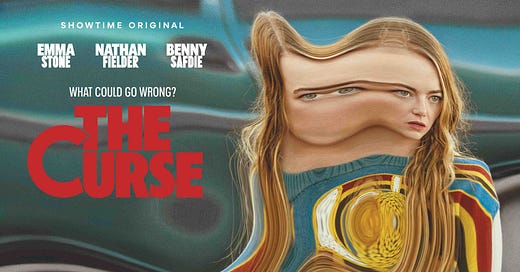This month saw the conclusion of the Showtime/Paramount+ ten episode series, The Curse. Nathan Fielder (the comedic mastermind behind Nathan For You) and Benny Safdie (one half of the duo that directed Uncut Gems) teamed up to write, direct, and star in what I can only describe as the television equivalent of having an anxiety attack in slow motion. The premise is that Fielder (Asher) and his wife Whitney, portrayed in an incredibly bold and daring performance by Emma Stone, are a couple hosting a new HGTV style series produced by Safdie (Dougie) about selling “passive homes” in the small town of Española, New Mexico. After Fielder, in a public display of generosity for the TV series, gives a young homeless girl $100 and promptly asks for it back when the cameras are not rolling, she “curses” him.
The question of what the curse is permeates throughout the entire series, as marital issues tear at the fabric of Asher and Whitney’s relationship, the show faces a series of obstacles, and everyone involved with this show seems to come out of it worse off than they were before. Is the curse privilege, wealth, dishonesty, a TikTok trend, actual witchcraft, karma, is it real at all?
If you are at all familiar with Fielder or Safdie, you know the former has a penchant for cringe comedy, and the latter tends to make incredibly frenetic, stressful films. The blending of these two elements into The Curse makes it an uncomfortable, agonizing watch that you will get so much out of if you watch it with an open mind, even if you absolutely hate it.
I loved it.
The Curse is about a thousand different things. The series most overtly works as a satire of a particularly popular brand of white-moderate liberalism that appears to act with the best of intentions while thinly covering up obvious self-interests and bad intentions. Narcissism, passive agressiveness, elitism, virtue-signaling, and microaggressions leak through every action.
The series also functions as an incisive peek behind the curtain of how exploitative, artificial, and damaging “reality” TV can be. This element feels especially close to home for Fielder, who made his fame with a show that was designed to reveal how people will disarm themselves and turn into strange, skewed versions of themselves when faced with a camera crew. In this way, The Curse feels like a meta-commentary on Fielder’s work, questioning and commenting on his own intentions as an artist who has worked on projects that some have described as mean-spirited.
What starts as a strange comedy that throws you off balance gradually develops into a surreal nightmare where the characters and the viewers alike will start to question whether the problems they face are self-imposed or the result of some cosmic punishment for their misdeeds. The voyeuristic cinematography and ambient score underline an otherworldly quality which elevates the tone of the series significantly. The slow-build may be tough to get through, but it pays off with one of the most provocative, unsettling finales I have ever seen.
You might even see parts of you reflected in some of what is skewered when the show holds up a mirror to the social, political, and personal biases we can all be guilty of, or calls into question the intentions of people who claim to be doing things for one reason when their interests lay in another. That discomfort is a feature, not a bug. The series is designed with this in mind.
You will be asking some tough questions about yourself by the end of it. If you give yourself over to the self-examination offered by this show’s distorted, disturbed reflection of our own reality, you might come closer to understanding and overcoming the curses that dictate how you live your life.




